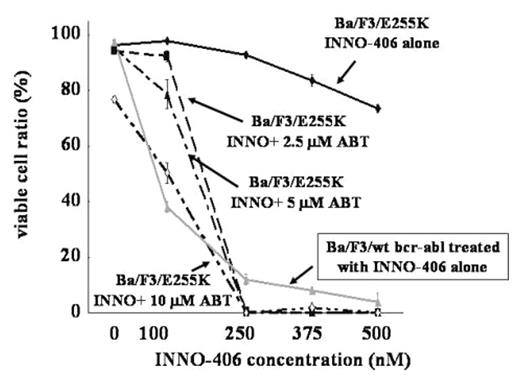Abstract
Aberrant tyrosine kinase activity of Bcr-Abl fusion oncoprotein by Philadelphia chromosome translocation is the causative as well as the primary molecular target in most of CML and approximately 20% of adult ALL. Though imatinib mesylate has improved the treatment of Bcr-Abl+ leukemia, resistance is often reported in patients with advanced-stage disease. To override imatinib-resistance mechanisms, we have developed INNO-406 (formerly NS-187; Kimura et al, Blood 2005), a novel Bcr-Abl/Lyn inhibitor that is 25~55-folds more potent than imatinib in suppressing Bcr-Abl+ leukemias, and is active against most of imatinib-resistant mutated Bcr-Abl except T315I. Phase I study on INNO-406 started in July 2006. To date, there is no data on the clinical-resistance profile of INNO-406. However, some patients may become resistance after the prolonged administration of INNO-406, as with other Abl kinase inhibitors such as dasatinib and nilotinib. A combination of targeted drugs with different specificities might overcome the problem of resistance (Komarova & Wodarz, PNAS 2005). Thus, we tried to find the best partner for INNO-406 based on the apoptosis-induction mechanisms of each agent. We found that apoptosis induced by INNO-406 was mediated by a Bcl-2 family-regulated intrinsic apoptosis pathway and required the activation of several BH3-only proteins such as Bim, Bad, Bmf or Bik. We investigated the combined effects of 17-AAG or bortezomib, both agents those are known to increase Bim and/or other BH3-only proteins. Neither 17-AAG nor bortezomib showed any additive effects on the accumulation of BH3-only proteins compared with INNO-406 alone. This finding suggested that INNO-406 alone activated BH3-only proteins maximally and combined effects for induction of apoptosis via the activation of BH3-only proteins could not be expected. Thus, we next examined the effects of ABT-737 (produced by Michael Andreeff), which was not an inducer of BH3-only proteins but an inhibitor for anti-apoptotic Bcl-2/Bcl-XL proteins. Intriguingly, ABT-737 augmented significantly the induction of apoptosis by INNO-406 not only in wild-type but also mutated Bcr-Abl+ leukemic cells (Figure). In conclusion, the combined therapy with a Bcr-Abl inhibitor, such as INNO-406, which induces BH3-only proteins strongly and an inhibitor for anti-apoptotic Bcl-2/Bcl-XL proteins such as ABT-737 might be the most rationale apoptosis-based molecular targeting approach against Bcr-Abl+ leukemias.
Disclosure: No relevant conflicts of interest to declare.
Author notes
Corresponding author


